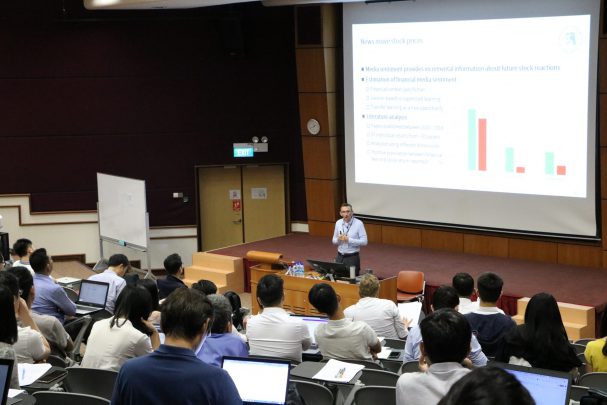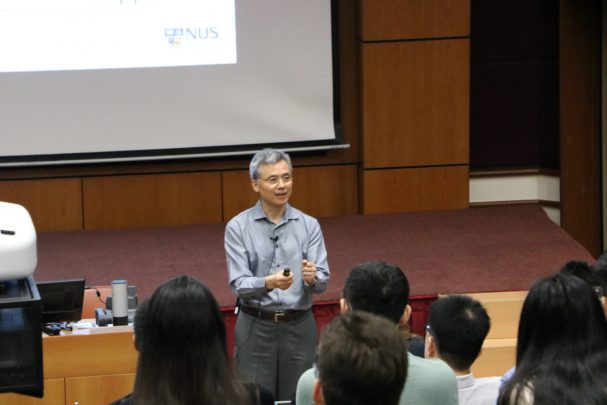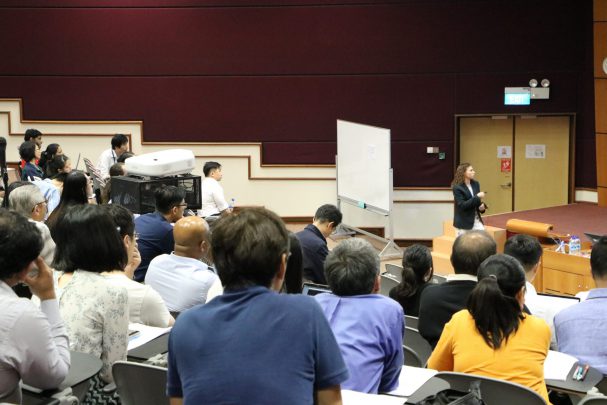| |
RMI Co-Hosts the Workshop on AI Powered Sentiment Analysis – NLP, Data Science and Others
|
|
|
| |
On 14 November 2019, RMI co-organized the “Workshop on AI Powered Sentiment Analysis – NLP, Data Science and Others” along with NUS’s Department of Mathematics and Centre for Quantitative Finance. Attended by over 150 participants from academia as well as industry, the workshop featured six presentations by academics from NUS, Singapore Institute of Management (SMU), Humboldt-Universität zu Berlin (HU Berlin), and Deutsch Bank AG. The workshop fostered a great environment for researchers, industry professional, and students to interact, share ideas, and engage in discussions on the future of AI, data science and related topics.
The full day workshop began with an opening remark from Prof. Zhu Chengbo, Head of NUS Department of Mathematics. This was followed by the first two talks of the day, “Measuring the Information Content of Financial News” by Prof. Ke Bin, Professor of Accounting, Provost’s Chair Professor, NUS Business School and “Linking Graphical Methods and Sentiment Analysis for Fake News Detection” by A/P Kan Min-Yen, Associate Professor and Deputy Director, NUS Institute of the Application of Learning Sciences and Education Technology (ALSET).
|
|
| |
In the first presentation, Prof. Ke described the model he and his co-authors have proposed in their recent research paper that automatically measures the information content of news text, trained using news and corresponding cumulative abnormal returns of listed companies. He explained that the existing methods for the same use sentiment signal features, which do not consider certain factors such as events. Prof. Ke and his co-authors address this issue by leveraging deep neural models to extract rich semantic features from news text. He concluded by saying that empirical results show that the neural models can outperform sentiment based models, demonstrating the effectiveness of recent NLP technology advances for computational finance.
Next, in his talk A/P Kan began by stating that many fake news detection methods stress fact verification to see whether a source’s statements can be validated against factual sources, and others attempt to leverage the regularity of how news and attitudes spread in our social networks. He added that their research builds up on this by examining the problem of fake news detection and stance detection using sentiment analysis features and state of the art XLNet embeddings on the main common datasets of CSI, Fake News Challenge and RumourEval 2019, and then examining a broader architecture involving a graphical representation where nodes are users, their comments on news articles, the news articles, and the websites / sources where those news articles originate from.
|
|
| |
The first presentation in the afternoon was “News Co-occurrence, Attention Spillover and Return Predictability” by A/P Tu Jun, Associate Professor of Finance, Lee Kong Chian School of Business at SMU. A/P Tu stated that their research examines the effect of investor spillover on stock return predictability. Using a novel measure, the News Network Triggered Attention index (NNTA), they found that NNTA negatively predicts market returns. The results are robust and inclusive of alternative attention proxies, sentiment measures, other news and information-based predictors, across recession and expansion periods. He added that their research further validates the attention spillover effect by showing that news co-mentioning leads to greater increases in Google and Bloomberg search volumes than unconditional news coverage.
Next Prof. Lessmann, Chair Professor of Information Systems, School of Business and Economics at HU Berlin, took the stage to talk about his research paper entitled “Media Sentiment and Stock Market Prediction”. He considers BERT, a powerful text classification methodology based on transfer learning and examines the degree to which BERT-based sentiment indices differ from conventional dictionary and machine learning-based indices when used as a cue to model financial market developments. He elaborated that corresponding studied often rely on dictionary-based methods to quantify media sentiment as a proxy for investment sentiment to test the effect of the latter on stock market returns. But given the advances in NLP and deep learning models, extraction of sentiment indicators from in text data can be substantially more accurate.
The last two talks of the day were on “Topic Sentiment Asset Pricing with DNN Supervised Learning” by Mr. Hitoshi Iwasaki form Department of Statistics & Applied Probability, NUS and “RatingBot: A Credit Risk Rating Methodology Based on Text Mining” by Dr. Diana Hristova from Risk Methodology team at Deutsche Bank. Mr. Iwasaki described their research on developing an innovative deep neural network (DNN) supervised learning approach to extracting insightful topic sentiments from analyst reports at the sentence level and incorporating this qualitative knowledge in asset pricing and portfolio construction. They found that topics reflecting the subjective opinions of analysts have greater impact than topics of objective facts and justification of the quantitative measures.
On the other hand, Dr. Hristova began her talk by stating that credit risk is at the core of banking business and its adequate measurement is crucial for financial institutions. She added that their research developed the RatingBot, a text mining based credit rating approach, which efficiently and objectively models relevant qualitative information based on textual sources. She elaborated that the approach is evaluated on two datasets and also the application of further approaches (e.g., Random Forest, embeddings) as well as discussed sources of qualitative information (e.g. news).
Given the current rapid advancements in the fields of AI, NLP, and data science this workshop provided a great platform for researchers, practitioners and enthusiasts in the field to get together and share their ideas. The workshop was organized by RMI Director Prof. Sun Yeneng, and RMI joint appointees A/P Chen Ying and Prof. Min Dai, both from Department of Mathematics.
|
|
|



